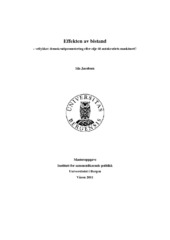| dc.contributor.author | Jacobsen, Ida | eng |
| dc.date.accessioned | 2011-09-05T06:36:56Z | |
| dc.date.available | 2011-09-05T06:36:56Z | |
| dc.date.issued | 2011-06-01 | eng |
| dc.date.submitted | 2011-06-01 | eng |
| dc.identifier.uri | https://hdl.handle.net/1956/4935 | |
| dc.description.abstract | The primary aim of this thesis is to contribute to the understanding of the question: Which effect does aid have on democratization? The answer to this has been remarkably diverse, ranging from arguments regarding how aid strengthens authoritarian tendencies to more optimistic approaches which maintain that aid has an important democratizing effect. This thesis has tested a range of the leading hypotheses concerning the relationship between aid and democracy using a panel analysis including all non-OECD countries from 1990 to 2007. The underlying objective is to contribute to this unsolved question by testing theories presented in earlier research that have not been tested empirically in a cross-national sample. In earlier research there is a range of theories concerning societal variables that are assumed to be the indirect mechanisms through which aid affects democracy. In addition there are also theories about societal factors that create an environment that contingent the effect of aid on democracy. This thesis thus entails a stronger emphasis on the causal mechanisms of the relationship between aid and democracy that has been left presupposed and untested in earlier research. First and foremost the analysis concludes that aid seems to have a positive effect. In addition, this effect seems to be caused by an indirect effect of aid leading to democracy through improving health conditions. However, the data also finds that this positive effect is not present in Africa. The data even shows that the contingent effect of this region is not only moderating this positive impact of aid, but it is actually strong enough to reverse the relationship between aid and democracy. This implies that the dichotomy in the title of the paper: effective democracy-promotion or oil to the machinery of autocracy in reality do not represent two mutually exclusive answers at all, but correct answers for different contexts. This finding indicates that the earlier research on this topic has not been sufficiently nuanced regarding the answers to the question about the effect of aid on democracy. Future research on this topic should therefore move away from too abstract models that do not take the possibilities of indirect and contingent effects into account. | en_US |
| dc.description.abstract | Hensikten med denne oppgavene er å ta opp spørsmålet hvilken effekt har bistand på demokrati? Svarene på dette spørsmålet har vært svært motstridende da man på den ene siden har de som argumenterer for at bistand kan fungere som "olje til et autokratisk maskineri" mens man på den andre siden har de som fremhever at bistand har en viktig demokratipromoterende effekt. Denne oppgaven har testet en rekke ledende hypoteser angående forholdet mellom bistand og demokrati, basert på en panelanalyse som dekker alle ikke-OECD land i perioden 1990-2007. Hovedmålet med analysen er å bidra til denne bistandsdebatten ved å teste teorier fra tidligere forskning som ikke tidligere har blitt testet i en kryssnasjonal analyse. I tidligere forskning finnes det en rekke teorier som antar at bistand har en indirekte effekt på demokrati som går via andre fenomener i samfunnet. I tillegg finnes det også teorier som antar at ulike forhold i samfunnet betinger effekten av bistand i en gitt retning. Denne oppgaven tar sikte på å teste denne typen teorier som fram til nå kun har forblitt teoretisk antatt. Funnene i denne analysen indikerer først og fremst at bistand ser ut til å ha en positiv effekt. I tillegg ser det ut til at denne effekten delvis er indirekte via forbedret helse i befolkningen. Analysen finner imidlertid også at denne positive effekten ikke ser ut til å gjelde i Afrika. Resultatene indikerer til og med at den betingende effekten av Afrika ikke bare moderer den positive bistandseffekten, men er så sterk at den snur retningen på effekten. Dette impliserer at oppgavens tittel: vellykket demokratipromotering eller olje til autokratiets maskineri?, ikke nødvendigvis representerer to gjensidig utelukkende svar, men derimot riktige svar i ulike kontekster. Dette funnet argumenterer for at tidligere forskning på dette emnet ikke har vært nyanserte nok når det kommer til svaret på dette spørsmålet. Fremtidig forskning på dette emnet burde derfor bevege seg bort fra abstrakte modeller som ikke tar høyde indirekte eller betingede effekter. | en_US |
| dc.format.extent | 547666 bytes | eng |
| dc.format.mimetype | application/pdf | eng |
| dc.language.iso | nob | eng |
| dc.publisher | The University of Bergen | eng |
| dc.subject | Bistand | nob |
| dc.subject | Demokrati | nob |
| dc.subject | Neopatrimonialisme | nob |
| dc.subject | Afrika | nob |
| dc.title | Effekten av bistand - vellykket demokratipromotering eller olje til autokratiets maskineri? | eng |
| dc.type | Master thesis | en_US |
| dc.description.degree | Master i Sammenliknende politikk | |
| dc.description.localcode | SAMPOL350 | |
| dc.description.localcode | MASV-SAPO | |
| dc.subject.nus | 731114 | eng |
| dc.subject.nsi | VDP::Social science: 200::Political science and organizational theory: 240::Comparative politics: 241 | eng |
| fs.subjectcode | SAMPOL350 | |
